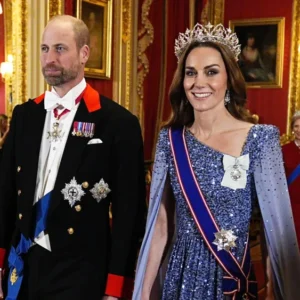In the fading light of an October evening in 2025, the cracked sidewalks of New Britain’s Clark Street bore witness to a horror unearthed from the ordinary. Behind an abandoned two-family home at number 80, overgrown weeds clawed at a weathered plastic storage tote, its lid secured with duct tape that had long since peeled away. On October 8, a tip from an anonymous caller—whispering of a man hauling the bin from cemetery woods to this forsaken spot—drew New Britain police to the scene. What they pried open was no forgotten junk: the mummified remains of 12-year-old Jacqueline “Mimi” Torres-Garcia, curled in fetal silence, her tiny frame a testament to unimaginable cruelty. Dead for over a year, since September 19, 2024, Mimi’s absence had gone unreported, her existence erased by those sworn to protect her. At the center of this abyss stood her mother, Karla Garcia, whose post-arrest words to detectives would chill the courtroom and the conscience of Connecticut alike: “I didn’t kill my daughter. She tried to run away from home twice and was caught. After that, I had to tie her up and not feed her to punish her.”
The discovery rippled through the tight-knit Puerto Rican enclave of New Britain like a seismic aftershock, a city already scarred by tales of domestic shadows. Mimi, with her wide brown eyes and infectious giggle—memories preserved in faded family photos shared by grieving relatives—had been a spark of light amid chaos. Born in 2013 to Karla Garcia and Victor Torres, her early years flickered with instability. Karla, then a young mother navigating detention for unspecified charges, surrendered her newborn to relatives, where Mimi thrived under the care of her paternal grandparents in Hartford. For nearly a decade, from infancy through elementary school, she knew stability: schoolyard games, birthday piñatas bursting with candy, and the steady rhythm of a household that, if not perfect, was safe. Victor and his parents fought quietly in court for permanence, their petitions a bulwark against Karla’s sporadic returns. But in May 2022, as Mimi turned nine, the tides shifted. A family court, with nods from the Department of Children and Families (DCF), granted guardianship to her parents, reuniting siblings under one roof. What followed was a slow unraveling, a descent into isolation that no one outside the walls could pierce.
By June 2024, sole custody had swung decisively to Karla, now 32, a woman whose life had hardened into survival mode. Living in a rented split-level on Wellington Drive in Farmington—a modest suburb 20 miles west of Hartford—she shared the space with her boyfriend, Jonatan Nanita, 35, a stoic construction worker with a temper forged in unhealed wounds. Together, they parented three young children of their own, a blended brood that swelled the household to seven. Mimi and her younger sister, just seven, navigated this new normal with tentative steps. Karla, once a fleeting presence, now ruled the roost, her decisions unchallenged. But whispers from the girls hinted at fractures: Mimi’s school attendance faltered, her grades dipping like stones in a well. In the spring of that year, Karla withdrew her from public classes, citing homeschooling—a legal loophole that shrouded the home in secrecy. Victor, estranged but vigilant, sensed the shift. “She was pulling away,” he later told investigators, his voice thick with regret. “I should have fought harder.” Custody battles had simmered for years—Victor’s parents alleging Karla’s instability, her side countering with claims of meddling—but exhaustion won. No one foresaw the void it carved.
Summer 2024 brought a transient boarder: Jackelyn Garcia, Karla’s 28-year-old sister and Mimi’s aunt, fresh from her own tangle with the law. Jackelyn, a single mother convicted of abusing her infant son—eight months in prison for shaking him in a haze of postpartum despair—sought refuge post-release. She bounced in and out of the Farmington house from June through August, sharing a cramped bedroom with Mimi and her little sister. What she witnessed there would haunt her confessions: a regime of control masquerading as discipline. Mimi, on the cusp of adolescence, chafed against the confines. She tested boundaries, her pleas for freedom manifesting in two desperate bids for escape. The first, in early July, saw her slip out a back door at dusk, barefoot and trembling, darting toward the neighborhood cul-de-sac. A neighbor spotted the wide-eyed girl and called authorities, but Karla arrived first, her face a mask of fury. Back home, the punishment was swift: zip ties cinched around Mimi’s wrists and ankles, binding her to a corner of the living room like a discarded pet. Pee pads, pilfered from a corner store, lined the floor beneath her, a humiliating barrier against accidents. “She was acting bad,” Karla would later justify to police, her tone flat, as if reciting a grocery list. “Needed to learn.”
The second runaway, in late August, echoed the first but cut deeper. Mimi, thinner now, her cheeks hollowing from skipped meals, waited for a rainy afternoon when Karla and Nanita argued in the kitchen. She bolted again, this time toward the woods edging the property, her small frame vanishing into the underbrush. Hours ticked by; panic simmered into resolve. Nanita, Karla’s enforcer in this grim household, tracked her down near a drainage ditch, his grip iron on her arm as he dragged her back. The penalty doubled: restraints tighter, isolation longer, and the cruelest twist—food withheld. Jackelyn, bunking there that week, captured the aftermath in a snapshot: Mimi, splayed on the pee pads, zip ties biting into her skin, eyes pleading upward at the camera flash. She texted the photo to Karla, a silent indictment or complicit warning—later, she’d claim the former, her voice breaking in interrogation. “I knew she was going to die,” Jackelyn admitted, tears carving tracks down her face. By mid-August, the weight of it crushed her; she fled to New Haven, severing ties, but the image lingered like a curse.
In the suffocating weeks that followed, the home on Wellington Drive became a pressure cooker. Nanita, whose word was law, decreed the ultimate sanction: starvation. For 14 days straddling September, Mimi received nothing but water, her body a battlefield against itself. Karla acquiesced, her maternal instincts eroded by codependence and fear. “He said it was for her own good,” she told detectives, deflecting as if Nanita’s shadow absolved her. Mimi weakened rapidly—dizzy spells, fainting against walls, whimpers fading to silence. On September 19, 2024, she slipped away in the dim basement, her heart surrendering to the famine. No ambulance wailed; no 911 call pierced the night. Nanita, pragmatic in his horror, wrapped her in bedsheets and descended the stairs, stashing her in a corner amid boxes of forgotten holiday lights. The odor hit like a verdict: decomposition’s sour bloom, infiltrating vents, clinging to curtains. By October, it was unbearable. The couple fled, bouncing between friends’ couches and budget motels, their three toddlers in tow, oblivious to the ghost haunting their wake.
Karla’s deception deepened. In January 2025, as DCF probed fresh allegations of neglect toward Mimi’s little sister—bruises glimpsed at a park playdate—the agency demanded a welfare check. Karla, ensconced in a New Britain rental, orchestrated the ruse: a neighbor’s child, coached in whispers, posed as Mimi on a Zoom screen. “I’m fine, just homeschooling,” the imposter parroted, her face a cruel facsimile under Karla’s watchful eye. DCF, stretched thin by caseloads and turnover, bought the charade, closing the file by March. No in-person visit; no deeper dig. Meanwhile, Nanita orchestrated the body’s odyssey: first to a cemetery’s edge in Farmington, shrouded in a black tote; then, in a midnight drive, to the Clark Street abandon, where weeds would guard it for eight more months. Karla knew—admitted as much—but buried the guilt under routine: diaper changes, daycare drop-offs, even the swell of pregnancy. In July 2025, she birthed a son, Nanita at her side, the cycle of life mocking the one extinguished.
The tip that cracked it came from shadows: a cemetery groundskeeper, perhaps, or a jilted acquaintance, spotting Nanita’s Acura idling oddly in the dawn. Police swarmed Clark Street on October 8, 2025, unzipping the tote to a scene etched in nightmares—Mimi’s remains, desiccated but identifiable via dental records, her 12-year-old frame locked in eternal youth. Autopsy confirmed the quiet killer: malnutrition, no blunt force, no poison—just the slow theft of sustenance. Arrests cascaded: Karla and Nanita, indicted for first-degree murder, their bond hearing a tableau of stony silence; Jackelyn, hauled in for cruelty and restraint, her photo evidence a noose of complicity. Victor Torres, Mimi’s father, collapsed in the precinct lobby, his sobs echoing down sterile halls. “My baby,” he wailed, clutching a teddy bear from her last birthday. Paternal grandparents, who had cradled her through infancy’s storms, lit vigil candles outside the courthouse, their “Justice for Little Mimi” signs fluttering in the autumn chill.
Connecticut reeled, the case a scalpel to systemic sores. DCF, under fire since the discovery, released a mea culpa timeline: involvement from Mimi’s birth, lapses in follow-through, the fatal Zoom folly. Lawmakers bayed for audits—Republican senators decrying remote checks as “virtual neglect,” Democrats pushing for caseload caps and mandatory home visits. “How many red flags?” thundered Sen. Jason Perillo in a Hartford hearing, slamming the table as Karla’s mugshot flickered on screens. The agency, guardian to 30,000 vulnerable souls, cited poverty’s vise: Karla’s family, immigrants scraping by on Nanita’s wages and sporadic aid, ensnared in a web of untreated trauma. Karla’s own youth—detention at 18, fleeting jobs, a string of unstable partners—mirrored the cycle she inflicted. Yet excuses rang hollow against Mimi’s silence.
For the family, grief wove with rage. Victor, granted emergency custody of the younger sister, pores over photos in his Hartford rowhouse, vowing therapy and vigilance. “She loved drawing unicorns,” he shares, voice fracturing. “Wanted to be a vet.” The grandparents, pillars of the Puerto Rican community, host potlucks turned memorials—arroz con gandules shared amid stories of Mimi’s dances at quinceañeras she never reached. Jackelyn, from her cell, pens apologies to the ether, her abuse conviction a prelude to this guilt. Karla and Nanita, remanded without bail, await trial in 2026, their defense a fragile weave of diminished capacity and mutual blame. Karla’s podcast notes, seized from her phone, reveal a warped redemption arc: “The world needs to know our pain,” she’d scribbled, as if suffering justified savagery.
A year on, Clark Street stands sentinel, a chain-link fence barring the curious, wildflowers pushing through cracked concrete like Mimi’s unspoken dreams. New Britain, a city of resilient souls, rallies: school assemblies on spotting abuse, DCF hotlines buzzing with tips. Victor plants a butterfly garden in her honor, each bloom a defiant flutter against the dark. Mimi’s story, unearthed from a tote’s tomb, demands reckoning—not just for one girl’s stolen breaths, but for the shadows where children vanish unheard. In her mother’s words, twisted as they are, echoes a deeper indictment: punishment as love’s counterfeit, silence as complicity’s cloak. As winter looms, Connecticut whispers her name, ensuring the girl once bound in zip ties now flies free in collective memory—a fragile light against the gathering night.




